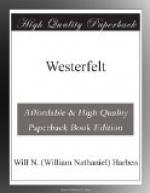When Westerfelt awoke it was early dawn. The outlines of the room and the different objects in it were indistinct. At the foot of his bed he noticed something which resembled a heap of clothing on a chair. He looked at it steadily, wondering if it could be part of the strange dreams which had beset him in sleep. As the room gradually became lighter, he saw that it was a woman. Mrs. Floyd, he thought—but no, the figure was slighter. It was Harriet. She had taken her mother’s place just before daybreak. Her head hung down, but she was not asleep. Presently she looked up, and catching his eyes, rose and came to him.
“How do you feel now?” She touched his forehead with her soft, cool hand.
“I’m all right; I’ll be up to breakfast.”
“No, you won’t; you must not; it would kill you.”
“Pshaw! That pin-scratch?” He playfully struck his breast near the wound. “He’d have to cut deeper and rip wider to do me up.”
She stifled a cry and caught his hand.
“You must not be so foolish.” She started to turn away, but his fingers closed over hers.
“I’m sorry. I’ll mind what you say, because you’ve been so good to me. It seems mighty queer—Toot Wambush’s girl takin’ care of the very man he tried to wipe off of the face of creation. No wonder he—”
She twisted her hand from his clasp. “Why do you say I’m his girl?”
“Because they all do, I reckon; ain’t you? Last night I heard him ask you to follow him.”
“You never heard me say I would, did you?”
“No, but—”
“Well, then!” She went to the fireplace. He could not see her, but heard her stirring the fire with a poker, and wondered if her movement was that of anger or agitation, For several minutes neither of them spoke; then she came to him suddenly.
“I forgot,” she said; “here’s a newspaper and a letter. Will Washburn left them for you.” She gave them to him and went to the window and raised the shade, flooding the room with the soft yellowing light from the east. Then she resumed her seat at the fire.
He opened his letter. The handwriting was very crude, and he did not remember having seen it before. Looking at the bottom of the last page, he saw that it was signed by Sue Dawson—Sally Dawson’s mother. It was not dated, and began without heading of any kind. It ran thus:
“So you left this place fur new pastures. But I Will be sworn you went off cause you could not see the sun ashinin on my Childs grave nor meet her old broke down mother face to face. I have wanted to meet you ever since she died, but I helt in. The reason I sent you word not to come to the Funeral was cause I knowed ef I saw you thar I would jump right up before the people and drag you with yore yaller Pumpkin face full of gilt right up to her Box an make you look at yore work. It was not out of respect fur yore feelings that I did




